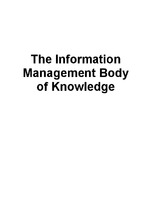| dc.description.abstract | This text is offered primarily as a reference source for postgraduate students who are concerned with the way that information works for organisations. Although there are good books available, none cover the ground in the way that is done here. This is intended to be a reference source that students can use as they work to research the many issues that we do not yet fully understand, and for others who are striving to manage information more effectively in their professional activities.
This is because many professional people (from all disciplines) have come to understand the importance of information in their work. Lawyers, teachers, journalists, logisticians: all are dependent on information for professional success and some choose to undertake part-time postgraduate studies in order to understand more about this. But the breadth of issues associated with information management practice is vast, extending from an understanding of the base technologies that are used, right through to questions of business strategy and how it can accommodate the potential benefits of information technology.
The central problem today for many people is the wide scope of the issues that need to be understood. Turning an investment in new information technology and information systems into improved business performance proves to be a tortuously difficult thing, and for many years initiatives of one kind or another have failed to assure success. This text gives an easily understood framework that relates business needs to new information technology opportunities in a relatively simple, staged way.
The framework presented here, known as the “Information Management Body of Knowledge” or just “IMBOK”, allows us to locate problems and opportunities and to move our ideas more easily from one domain to another – from consideration of raw technologies through to issues of business practice and business strategy. It also provides us a means to organise the literature about the subject and it is hoped that the fruits of present and future research will accumulate within and around the IMBOK framework. Using it, it is hoped that future students, professionals and managers will have easier access to the diverse tools and techniques that they need; further, researchers will have the means to position their research ideas and to share them with others, more effectively than would otherwise have been possible.
In this way, this text is intended to provide a reference for those who are concerned to bridge any actual or perceived divides between information technology “specialists” and business “generalists”. So, this text should be useful for …
• Researchers who are anxious to position their work in a context of some kind, where that work is in some way IT-related even if distantly.
• Students who are looking for a simple contextual framework within which to organise their ideas, when all that they are hearing and reading becomes too complex to understand easily.
• Managers who wish to choose appropriate management tools to ease the difficulty in marrying strategy and strategic implementation to the many opportunities and problems presented by technology.
Of course, organising the issues in such a simplistic way might be misleading. Real life is not simple, and the tendency – evident for many years now – of “IT people” to try and reduce complexity by reduction, masks some of the unexpected connections that might exist outside the simple view that is presented. For example, if in an organisation the chief executive office decides that it is necessary to introduce workflow systems, and to eliminate all paperwork, then there can be no doubt that the workforce at all levels will set about exactly that, whatever their misgivings. What readers of this text might find is that there is too little attention to the soft issues: the attitudes that people adopt, the cultural factors that colour everything that goes on in a business, and the relationships between people that so often override pure logic.
In a conversation in the UK, a senior academic remarked that the issue of the moment is indeed culture: if an organisation has no cultural bias to embrace and adopt change, then investments related to change are doomed to difficulty, or even outright failure. However, if we are to avoid hopeless complexity we can only adopt one perspective at a time and the view presented here is relentlessly reductionist. It may be the product of a “left-brained” mind, but at least it gives us a comprehensible framework around which to debate our problems and to begin to organise the balance of our difficulties, however soft, people-related or cultural they may be. | en_US |

